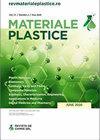具有电磁性能的漆膜的物理化学特性
IF 0.6
4区 材料科学
Q4 MATERIALS SCIENCE, MULTIDISCIPLINARY
引用次数: 0
摘要
电磁兼容性问题和这些辐射产生的电磁兼容性问题是电气和电子产品的主要问题,主要涉及通信、信息技术、运输、安全和医疗服务领域。本文介绍了获得具有电磁屏蔽性能的纳米结构涂料/塑料/纳米粉末涂料体系的方法,并通过FTIR分析、DSC和介电测试对其进行了表征。这些系统具有电磁干扰(EMI)/电磁兼容性(EMC)和静电放电(ESD)应用,可用于制造各种电子设备和汽车行业的外壳。在实验室层面,获得了4个编码为M1-M4的非加性实验模型(EM)和16个编码为M5-M20的加性实验模式。这些材料的革命性之处在于,它们内部是绝缘的,在外部,它们的行为就像一个盾牌。从对16种添加剂系统进行的介电测试中获得的结果表明,具有最大百分比(20%)的金属纳米粉末的样品显示出最高的电导率值。在所使用的两种纳米粉末中,来自样品M11、M12、M19和M20的Fe的纳米粉末诱导复合物比Al纳米粉末具有更高的电导率。分析的两种油漆样品的ATR/FTIR光谱显示它们几乎相同,这表明测试的油漆具有相同的基本化学结构。DSC分析表明,与无颜料涂料(V1)相比,颜料涂料(V2)具有较低的热氧化稳定性和较低的分解温度,因此,与V1相比,在使用条件下,在正常环境因素(温度、湿度、自然光或人造光等)的影响下,V2的稳定性较差。本文章由计算机程序翻译,如有差异,请以英文原文为准。
Physico-chemical Characterization of Paint Films with Electromagnetic Properties
Electromagnetic compatibility issues and those generated by these radiations are a major concern for electrical and electronic products, mainly in the fields of communications, information technology, transportation, security and medical services. The paper presents the way to obtain nanostructured paint/plastic/nanopowder paint systems with electromagnetic shielding properties, as well as their characterization by FTIR analysis, DSC and dielectric tests. These systems have Electro-magnetic Interference (EMI)/Electromagnetic Compatibility (EMC) and Electrostatic Discharge (ESD) applications in the manufacture of enclosures for various electronic devices and for the automotive industry. At the laboratory level, 4 non-additive experimental models (EM) coded M1-M4 and 16 additive experimental models coded M5-M20 were obtained. Revolutionary to these materials is the fact that inside they are insulating and, on the outside, they behave like a shield. The results obtained from the dielectric tests performed on the 16 additive systems showed that the samples with a maximum percentage (20 %) of metal nanopowders show the highest values of electrical conductivity. Of the two nanopowders used, that of Fe from samples M11, M12, M19 and M20 which induces the composite higher conductivities than Al nanopowders. The ATR/FTIR spectra of the two paint samples analyzed showed that they were almost identical, suggesting that the paints tested had the same basic chemical structure. DSC analysis showed that pigment paint (V2) has low thermal oxidation stability and lower decomposition temperatures than pigment-free paint (V1), therefore, V2 is less stable under usage conditions, under the influence of normal environmental factors (temperature, humidity, natural or artificial light, etc.) compared to V1.
求助全文
通过发布文献求助,成功后即可免费获取论文全文。
去求助
来源期刊

Materiale Plastice
MATERIALS SCIENCE, MULTIDISCIPLINARY-
CiteScore
1.40
自引率
25.00%
发文量
99
审稿时长
6-12 weeks
期刊介绍:
Materiale Plastice, abbreviated as Mater. Plast., publishes original scientific papers or guest reviews on topics of great interest.
The Journal does not publish memos, technical reports or non-original papers (that are a compiling of literature data) or papers that have been already published in other national or foreign Journal.
 求助内容:
求助内容: 应助结果提醒方式:
应助结果提醒方式:


